Junction Reads, Wild Prose Readings, Mary Turfah, Deborah Dundas interviews Omar El Akkad, Remembering Canadian artist Kelly Mark, fiction by Amber Nuyens, Hannah Black, David Lynch & more!
Send My Love to Anyone is a newsletter on all things writing where Kathryn Mockler writes about the writing process and other troubles and invites guests to share their work.
Send My Love to Anyone supports small and independent presses and writing that intersects human rights, collective liberation, anti-oppression, and the climate crisis.
Send My Love to Anyone is a reader-supported publication. To receive new posts and support this project, consider becoming a free or paid subscriber.
Learn more about Send My Love to Anyone
What’s in Gatherings Issue 44My NewsMy video Do You Know What’s Great adapted from a story in my short fiction collection Anecdotes will be screening online at the Reel Poetry International Festival.
Screening: Wednesday, April 2, 2025 at 1:00 - 1:30 p.m. CST and 7:00-7:30 p.m. CST
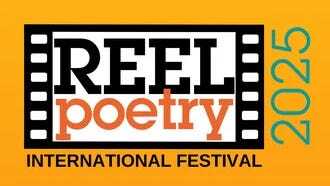 Kirby News
Kirby NewsKirby will be having the grand good fortune to read in support of Jessica Hiemstra's new book Book Root (Goose Lane Editions) along with fellow poet Shannon Bramer at the palace of poetry, The Printed Word, Dundas, ON, March 20th 7pm.
Kirby, will be live on April 17 at 7:00pm (EST) chatting with from Junction Reads!
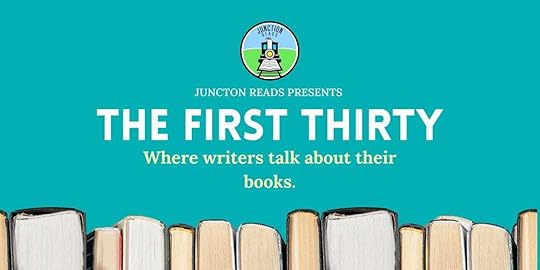 Events
Events’ Wild Prose Readings Presents Soundin’ Canaan: Black Canadian Poetry, Music, and Citizenship with Paul db Watkins and Wayde Compton on March 13, 2025
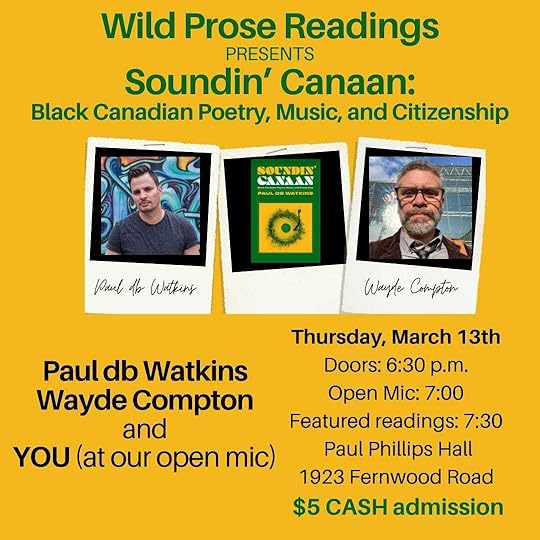 What I’m Reading
What I’m ReadingRecognition and alienation in the work of Isabella Hammad by Mary Turfah in Bookforum
AS NEWS BROKE that a ceasefire agreement—tenuous, immediately delayed by Israel—had been signed, celebrations filled Gaza’s streets. People allowed themselves to take in this victory: the naked force of the entire West had failed, for over a year, to break their will. When news of the ceasefire reached me, via phone notification, I started crying. But where I’d anticipated feeling some sense of closure, I felt instead like I was finally allowing myself to look through a door that I’d left open. During the acute phase of the genocide, there were questions many of us hadn’t allowed ourselves to ask. Among the heaviest: What will happen to these children? A small boy with dark circles under his eyes was asked recently what he would do on the first day of the ceasefire. “I want to go to [see] my mom,” he answered. “My mom died—I want to visit her grave and read al-fatiha [a prayer] for her.”
Remembering Canadian artist Kelly Mark, the 'working-class conceptualist' by Dave Dyment
It's rare that an artist's work can be summarized in a few words, and rarer still when that artist is prolific in a wide variety of media. Toronto artist Kelly Mark produced sculptures, drawings, photographs, audio, video, performance, text work, tattoos, mail art and multiples, about a myriad of subject matter.
I'm not sure who originated the term "working-class conceptualist" to describe her and her practice, but it was apt enough to follow her throughout her career, and astute enough to withstand scrutiny.
I always understood it to refer to the fact that the work is smart without being smug, funny without being trite, and completely absent of pretence or academic trappings. She brilliantly conflated the repetition of the minimalist and process-based work championed by the Nova Scotia College of Art and Design — where she studied — with the repetitive tasks of so much manual labour.
Deborah Dundas interviews Omar El Akkad in The Toronto Star
Omar El Akkad: Because I think courage is contagious, and I think there are many battlefields in which the state or the institution or ... institutional power hold immense advantage, the arena of violence being one. But there are ones in which human beings in solidarity with one another hold immense advantages, ones that the state or the institution cannot mimic: joy, love, compassion.
spoke with 20 people in Gaza after the ceasefire
 Mohammed R MhawishSnapshots: I spoke with 20 people in Gaza after the ceasefire. My heart broke 20 timesIn the weeks following the ceasefire, I spoke with twenty people in Gaza—mothers, fathers, children, and grandparents—to hear about their first moments, days, and weeks after the bombs stopped. Their stories are not just about survival. They are about loss: of homes, of loved ones, of dreams, of the rhythms of everyday life…Read morea month ago · 352 likes · 37 comments · Mohammed R. Mhawish
Mohammed R MhawishSnapshots: I spoke with 20 people in Gaza after the ceasefire. My heart broke 20 timesIn the weeks following the ceasefire, I spoke with twenty people in Gaza—mothers, fathers, children, and grandparents—to hear about their first moments, days, and weeks after the bombs stopped. Their stories are not just about survival. They are about loss: of homes, of loved ones, of dreams, of the rhythms of everyday life…Read morea month ago · 352 likes · 37 comments · Mohammed R. MhawishA reading list to process the state of the world from
 Mother, Loosen My TongueA reading list to process the state of the world“We are never as steeped in history as when we pretend not to be, but if we stop pretending we may gain in understanding what we lose in false innocence. Naiveté is often an excuse for those who exercise power. For those upon whom that power is exercised, naiveté is always a mistake…Read more2 months ago · 982 likes · 18 comments · Huda Hassan
Mother, Loosen My TongueA reading list to process the state of the world“We are never as steeped in history as when we pretend not to be, but if we stop pretending we may gain in understanding what we lose in false innocence. Naiveté is often an excuse for those who exercise power. For those upon whom that power is exercised, naiveté is always a mistake…Read more2 months ago · 982 likes · 18 comments · Huda HassanI just discovered an food and culture magazine and incorporates culture and politics.
At Vittles, we think about food as economy, class, inheritance, and political agency, rather than just a dish on a table. We publish essays about all aspects of food culture, from deep dives to polemics, from personal essays to reported journalism, as well as restaurant recommendations, recipes, and reviews.
 Vittles Starving PalestineGood morning and welcome to Vittles. In today’s newsletter, Manal Shqair writes about how Israel’s colonial systems of land-grabbing, industrial agriculture and surveillance affect nomadic-pastoralist communities in Masafer Yatta in southern Palestine…Read morea month ago · 119 likes · 6 comments
Vittles Starving PalestineGood morning and welcome to Vittles. In today’s newsletter, Manal Shqair writes about how Israel’s colonial systems of land-grabbing, industrial agriculture and surveillance affect nomadic-pastoralist communities in Masafer Yatta in southern Palestine…Read morea month ago · 119 likes · 6 commentsBeware the man whose handwriting sways like a reed in the wind Anne Carson in the London Review of Books
This is an essay about hands and handwriting. I think of handwriting as a way to organise thought into shapes. I like shapes. I like organising them. But because of recent neurological changes in my brain I find shapes fall apart on me. My responsibility to forms can’t be gracefully fulfilled. Nonetheless, I offer the following in the hope it does not strike you as dishevelled or depressing.
Come as You Are: Remembering Joe Brainard in letters to friends, lovers, and fans by Andrew Chan in Bookforum
EVEN A CURSORY GLANCE at the life of Joe Brainard reveals him to have been something of a genius of friendship. Since the artist and writer died of AIDS-induced pneumonia in 1994 at the age of fifty-three, his legacy has been steadfastly tended to by a band of his contemporaries, who jump at the chance to rhapsodize at length not just about the man’s achievements but also his gentleness and unpretentiousness. Foremost among these evangelists is the poet Ron Padgett, whose close bond with Brainard began when the two were high school classmates in Tulsa, Oklahoma, in the 1950s. In the past two decades, Padgett has published the unabashedly affectionate memoir Joe, edited an authoritative anthology of Brainard’s writing, and served as the narrator of a short film about his friend, directed by the documentarian Matt Wolf. It’s easy to understand the urge to advocate for Brainard’s place in history. A staunchly idiosyncratic devotee of small-scale work, he was well-reviewed during his lifetime without ever becoming a brand name in the art world, partly due to his lack of skill and interest in the business side of his profession. One imagines that, by posthumously shepherding him into the spotlight, his friends are trying to reconcile a long-held desire to see him succeed with their respect for his humility.
offers advice on how to write while deeply distracted.
 SubMakkHow to Write While Deeply Distracted I’m not saying I’m concentrating well right now—that would be psychotic. But I’m never focusing well, and over a lifetime of first masking and then, more recently, dealing with ADHD head-on, I’ve developed enough coping strategies that I can actually get stuff done. Including writing…Read more25 days ago · 218 likes · 18 comments · Rebecca Makkai
SubMakkHow to Write While Deeply Distracted I’m not saying I’m concentrating well right now—that would be psychotic. But I’m never focusing well, and over a lifetime of first masking and then, more recently, dealing with ADHD head-on, I’ve developed enough coping strategies that I can actually get stuff done. Including writing…Read more25 days ago · 218 likes · 18 comments · Rebecca Makkai“Deer Crossing ” by Amber Nuyens in Moss
When the couple drowned after running their car into the lake just after graduation, Jamie’s dad told her that if she ever ended up in the water like that, the first thing to do was to roll down her window. This was the second piece of driving advice from her dad she remembered. The first was that if an animal jumped in front of her on the road, she should accelerate so that the animal might fly over the car instead of going through her windshield. This would also probably kill it instantly and she wouldn’t leave it suffering or have to put it down herself. Don’t swerve, he told her. You’ll hit a tree or drive into oncoming traffic and then everyone but the animal is dead.
interviews in
 Women WritingFeatured Writer: Sonal Champsee Welcome to Women Writing…Read more7 days ago · 12 likes · 4 comments · Liisa Kovala
Women WritingFeatured Writer: Sonal Champsee Welcome to Women Writing…Read more7 days ago · 12 likes · 4 comments · Liisa Kovalaon How to Sell a Story
 Writing for People Who Hate WritingHow to Sell a StoryThe world is full of journalism schools and writing advice, but there’s surprisingly little formal guidance out there about how to get your non-fiction articles published. That’s a surprise. At many outlets where I’ve worked, about half of the stories were assigned by editors to staff or freelance contributors, while the other half were proposed by writ…Read more5 days ago · 4 likes · 2 comments · Jessica Johnson
Writing for People Who Hate WritingHow to Sell a StoryThe world is full of journalism schools and writing advice, but there’s surprisingly little formal guidance out there about how to get your non-fiction articles published. That’s a surprise. At many outlets where I’ve worked, about half of the stories were assigned by editors to staff or freelance contributors, while the other half were proposed by writ…Read more5 days ago · 4 likes · 2 comments · Jessica JohnsonI’m also reading If on a winter’s night a traveler by Italo Calvino and enjoying it immensely—not just for its innovative structure but really blown away by Calvino’s gift for description. This book is all hook!
“The world is falling apart and trying to lure me into it’s disintegration.”
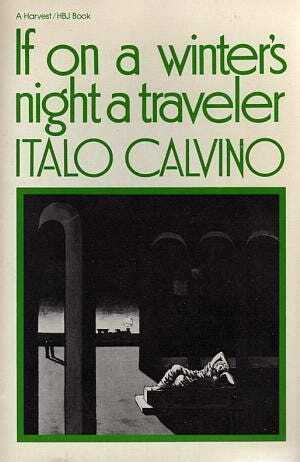
Just finished I Who Have Never Known Men by Jacqueline Harpman. This book seems to be making the rounds again. I kept hearing about it and then finally it came up in my library app.
This is an eerie and relevant book.
“Perhaps you never have time when you are alone? You only acquire it by watching it go by in others, and since all the women have died, it only affects the scrawny plants growing between the stones and producing, occasionally, just enough flowers to make a single seed which will fall a little way off—not far because the wind is never strong—where it may or may not germinate. The alternation of day and night is merely a physical phenomenon, time is a question of being human and, frankly, how could I consider myself a human being, I who have only known thirty-nine people and all of them women? I think that time must have something to do with the duration of pregnancies, the growth of children, all those things that I haven’t experienced. If someone spoke to me, there would be time, the beginning and end of what they said to me, the moment when I answered, their response. The briefest conversation creates time. Perhaps I have tried to create time through writing these pages. I begin, I fill them with words, I pile them up, and I still don’t exist because nobody is reading them. I am writing them for some unknown reader who will probably never come—I am not even sure that humanity has survived that mysterious event that governed my life. But if that person comes, they will read them and I will have a time in their mind. They will have my thoughts in them. The reader and I thus mingled will constitute something living, that will not be me, because I will be dead, and will not be that person as they were before reading, because my story, added to their mind, will then become part of their thinking. I will only be truly dead if nobody ever comes, if the centuries, then the millennia go by for so long that this planet, which I no longer believe is Earth, no longer exists. As long as the sheets of paper covered in my handwriting lie on this table, I can become a reality in someone’s mind. Then everything will be obliterated, the suns will burn out and I will disappear like the universe.”
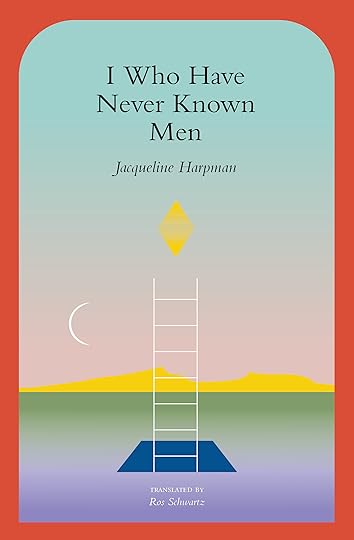
I blurbed A Song for Wildcats by Caitlyn Galway and will be doing an interview with her soon. This is an outstanding story collection. Highly recommend.
What I’m WatchingThey Shoot Horses, Don’t They? (1969)This is a deeply strange and disturbing film. Jane Fonda’s acting is incredible. Relevant story for these terrible times. This is a movie for those who like their bleak very bleak.
Jeffrey Sachs: “The US is leading us closer to nuclear war.”
A terrifying interview. Where we are now was planted many many years ago.
2 into 1 by Gillian WearingMy Cuntry Tis of Thee (2018) by Marilyn Minter HD Digital Video, 09:45 minutesWriting and Making, Writing as Making - Hannah BlackMy Bodies by Hannah BlackSaute ma ville (1968) by Chantal Ackerman
HD Digital Video, 09:45 minutesWriting and Making, Writing as Making - Hannah BlackMy Bodies by Hannah BlackSaute ma ville (1968) by Chantal AckermanFrom Criterion
For My Aching BackFrom the Archives
Directed by Chantal Akerman • 1968 • Belgium
Made when the director was just eighteen, Chantal Akerman’s debut film is a blistering first expression of what would become one of her major themes: women’s confinement in and rebellion against the domestic sphere. Akerman plays a young woman who, alone in her kitchen, enacts a savaging of traditional domestic rituals that leads to a literally explosive climax.



